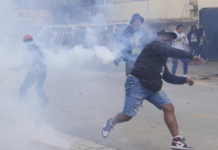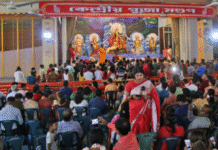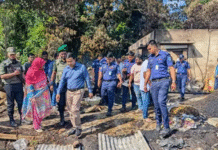Benar News
By Abdur Rahman and Jesmin Papri on Mar 24, 2021
Bangladesh officials denied Wednesday that a barbed-wired fence around Rohingya refugee camps disrupted relief and rescue work during and after a massive fire at a refugee settlement this week that left at least 11 people dead.
They also denied United Nations claims that around 400 people were missing after the blaze at the Balukhali camp, saying many of those who fled the fire were sheltering in neighboring camps in southeastern Cox’s Bazar district.
Mohammad Shamsud Douza, an additional commissioner for refugee relief and repatriation, said it took a long time for firefighters to extinguish the blaze, not because of the fence but weather conditions.
“It is not correct to say that rescue operations are disrupted due to barbed-wire fencing,” Douza told BenarNews.
“It took time to douse the fire mainly because of the high wind speed. Moreover, the fire was spreading rapidly as the camp is densely populated.”
The fire injured more than 500 people, gutted 10,000 makeshift shelters and left 45,000 refugees homeless, according to UNHCR, the U.N. refugee agency.
Complicating matters was the almost fully installed barbed-wire fence surrounding the congested and densely populated Rohingya camps in Cox’s Bazar, humanitarian groups said on Tuesday.
“Rescue efforts proved to be challenging as a result of the presence of perimeter fencing. In some instances, refugees themselves cut through the fence to escape the fire,” the Inter Sector Coordination Group, a coordinating group of various international NGOs and humanitarian aid agencies, including those affiliated with the U.N., said in a statement on Tuesday.
Most of the 1 million Rohingya who fled from neighboring Myanmar live in 34 refugee camps in and around Cox’s Bazar, a district that borders Myanmar’s Rakhine state. The refugees include more than 740,000 who escaped a brutal military crackdown in Rakhine in 2017.
Bangladeshi officials had said in January that the government’s installation of barbed-wire fencing around Rohingya would keep the Rohingya safe and secure and would also deter their “criminal activities.”
In a joint statement on Wednesday, a host of local and international NGOs said the Bangladesh government needed to rethink fencing in the camps.
“Fences across roads into camps should be reconsidered, and pocket gates should be opened and staffed for 24-hour access, to ensure safe passage during emergencies and access for emergency response services,” the groups’ statement said.
Missing after the fire
On Wednesday, Bangladeshi authorities reiterated that the death toll from the fire was 11, not 15 as UNHCR had reported a day earlier.
“We are continuing to confirm figures with the authorities of Bangladesh and understand only 11 deaths have been officially declared and bodies identified to date,” Louise Donovan, the spokeswoman for UNHCR’s Dhaka office, told BenarNews on Wednesday.
However, BRAC, the largest NGO in Bangladesh, said that at least 13 people had been killed in Monday’s fire, including six children.
Donovan said that, as of Wednesday, 339 people remained unaccounted for since the fire, but Refugee Relief and Repatriation Commissioner Shah Rezwan Hayat rejected this.
“No one is missing. The affected Rohingya took refuge at the nearby camps, learning centers and mosques. They have already started returning,” Hayat told BenarNews.

A Rohingya refugee rests under a temporary shelter on the site of his burned house at the Balukhali camp in Cox’s Bazar, Bangladesh, March 23, 2021. [Sunil Barua/BenarNews]
Cause of fire still unknown
Bangladesh officials said Wednesday they were still investigating the fire’s cause.
Monday’s blaze was the largest of at least 25 major fires in Cox’s Bazar camps since 2017, officials had said.
In another massive fire at a camp on Jan. 14, more than 550 shelters were gutted, leaving some 3,000 Rohingya homeless, but there were no fatalities.
The risk of fires is high in the sprawling camps, Otto Van Manen, country director for Save the Children, had said this week.
As he visited the site of the fire, Bangladesh Home Minister Asaduzzaman Khan Kamal reiterated that the Rohingya were welcome to move to a remote Bay of Bengal island, where the government has relocated thousands of refugees.
“We will welcome the Rohingya to Bhashan Char if any of the affected Rohingya desire to do so,” the minister told reporters on Wednesday.
“Very good arrangements have been put in place in Bhashan Char,” he said, referring to the island.
The government had said it spent about U.S. $280 million to construct housing, a large embankment, and other infrastructure on Bhashan Char in a bid to relieve pressure on the crowded camps in mainland Cox’s Bazar.
Authorities had said the facilities on the island were better than in the refugee camps.









